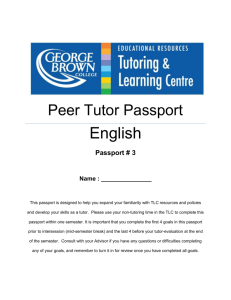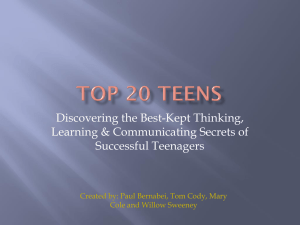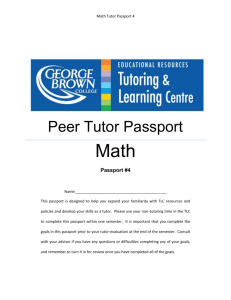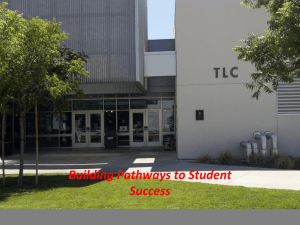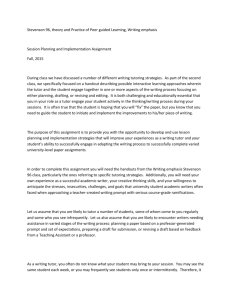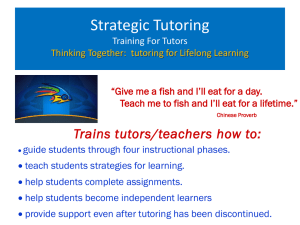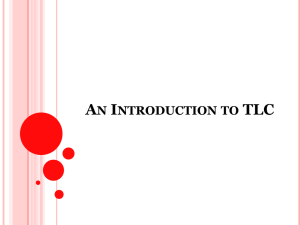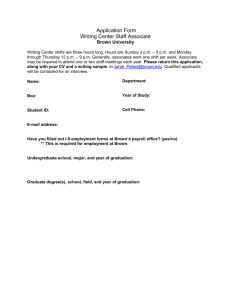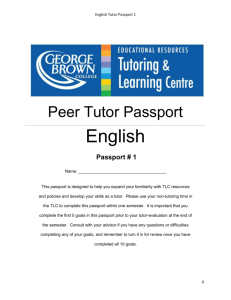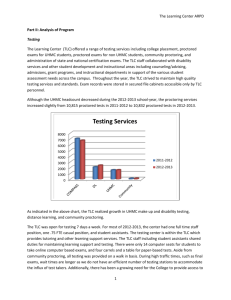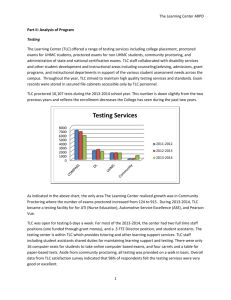Peer Tutor Passport - George Brown College
advertisement
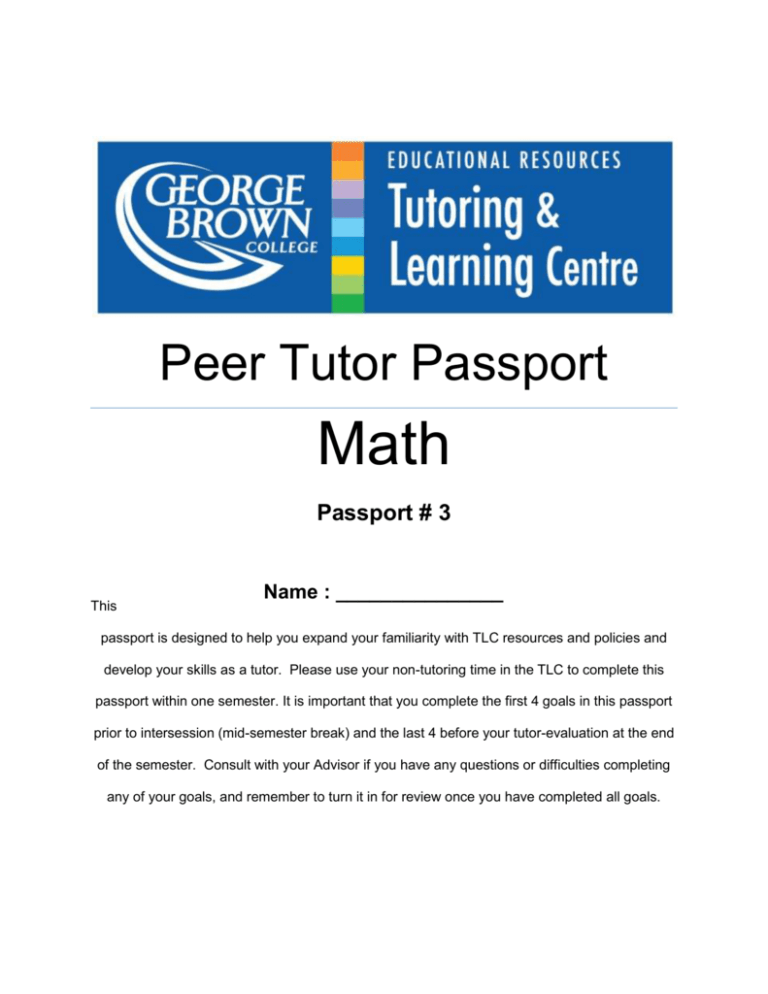
Peer Tutor Passport Math Passport # 3 This Name : _______________ passport is designed to help you expand your familiarity with TLC resources and policies and develop your skills as a tutor. Please use your non-tutoring time in the TLC to complete this passport within one semester. It is important that you complete the first 4 goals in this passport prior to intersession (mid-semester break) and the last 4 before your tutor-evaluation at the end of the semester. Consult with your Advisor if you have any questions or difficulties completing any of your goals, and remember to turn it in for review once you have completed all goals. GOAL 1: Create a S.M.A.R.T goal for the semester. (Make sure to share your goal with your TLC Advisor and ask questions if needed.) S.M.A.R.T goals are used to ground your development and help you move forward in a measurable and realistic way. Specific – A specific goals has a better chance of being achieved. You should be able to answer WHO (is involved); WHAT (do I want to accomplish); WHEN (establish a timeline); WHICH (requirements and constraints); and WHY (purpose or benefits) Measureable – You need to establish solid criteria for measuring progress toward the goal you are setting. You should be able to answer: “How will I know it has been accomplished?” Attainable – Goals need to be realistic in terms of setting an objective that you are both willing and able to work toward. Don’t confuse an ambitious goal as being unrealistic. Only you can decide just how high your goal should be. Relevant –With specific goals that have concrete steps and a timeline, almost any goal is attainable. But is it worthwhile? As a tutor, how will this goal meet the needs of the TLC or TLC clients? Timely – All goals should have a timeline. Goals are more attainable when grounded in a specific timeline. “Someday” is not a timeline. Set a realistic timeline and you have more opportunity to achieve your goal. Write your SMART goal here: (How do you plan to improve as a tutor this semester?) In the spaces below, explain how the goal, which you’ve identified above, meets the criteria below: Specific Measureable Attainable Relevant Timely GOAL 2: Develop your tutoring strategies Watch the following video: https://www.youtube.com/watch?v=RsbqtMOAgg8 After watching the video, write a detailed reflection paragraph on how this video might inform your future tutoring sessions. GOAL 3: Learn about working with students with disabilities Visit the following website: http://www.uoguelph.ca/tss/uid/uidbrief.pdf What are the principles of Universal Instructional Design (UID)? 1. 2. 3. 4. 5. 6. 7. How do you/can you incorporate these principles into tutoring sessions? Why might it be a good idea to incorporate these principles into ALL of your tutoring sessions? GOAL 4: Discuss dealing with inappropriate behaviour in the TLC A. All of the topics listed below could be potentially problematic if they come up during a tutoring session, or while you are in the TLC. Of these topics, which 2 do you think would never be appropriate to discuss in the TLC? Explain why you think so. Past relationships Physical and mental health Sex Cultural Stereotypes issues Gossip Politics Other tutees/tutors Unfair teachers Religious affiliations Private tutoring Explain: 1. 2. B. Of the topics you did not circle, choose one to discuss. In what circumstances might it be appropriate to discuss these topics, and in what circumstances would you need to divert the conversation to a more appropriate topic? How would you do so? A student you are working with makes some potentially offensive comments about another student’s race or sexuality during your session. As an employee of George Brown you know that such behavior shouldn’t be tolerated, but you want to get the student back on track. What is an appropriate response to these comments? GOAL 5: Math Skills Development When tutoring mathematics a commonly asked question from our tutees is “Why do I need to know this?” Although mathematics has countless applications in the real world these are not always promoted and made explicit in math classes. To help answer the question of “Why do I need to know this?” this section of the passport will allow you to explore some real-world applications of math. Check out the following website resources: http://www.thirteen.org/get-the-math/ http://ed.ted.com/series/math-in-real-life http://www.cemc.uwaterloo.ca/resources/real-world.html Using ideas from these websites as well as your own experience learning math fill out the chart below. Pick at least 4 math concepts that are commonly tutored at your campus. Math concept How is it used in the real world? GOAL 6: Make math skills relevant to real life In addition to applications of math in the real world, learning math allows students to develop many transferable skills and competencies that can be used in any profession. Make a list of the skills or competencies that you believe are developed in math courses. Attention to detail Patience and perseverance GOAL 7: Develop transferable work skills: Intercultural communication The Tutoring and Learning Centre at George Brown College serves a highly diverse community of students. As a TLC Peer Tutor, you should be prepared to work with students coming from a variety of backgrounds and life experiences. A. INTERCULTURAL COMMUNICATION What does intercultural communication mean to you? Choose ONE article on intercultural communication from the following resource: http://www.kwintessential.co.uk/cultural-services/articles-intercultural.html Which article did you choose? Reflect on the article that you have read. What are the main ideas presented in the article? How can you implement these ideas in your tutoring practice at the TLC or your future career? The Do’s and Don’ts of Intercultural Communication. Read each statement below and label it as either a “do” or a “do not” on the line beside it. _______ be patient _______ use plain, direct language _______ check for understanding _______ make assumptions _______ be aware of your nonverbal communication (e.g. hand gestures, eye contact) _______ respect personal space _______ ask for clarification, if needed _______ accept bribes or elaborate gifts _______ use active listening skills _______ tell jokes that may be misinterpreted in any way _______ put your feet up on the chair during a tutoring session _______ be aware that the same gesture can mean different things in different cultures _______ treat all people as individuals _______ make unfair judgements about a person or another culture _______ pay attention to others’ nonverbal communication cues _______ be very careful about touching in any way _______ perpetuate stereotypes _______ be polite and respectful at all times _______ explicitly encourage students to ask questions _______ examine your own culture with a critical lens _______ use symbols, diagrams and pictures when appropriate _______ be professional at all times _______ expect students to understand idioms and culture-specific expressions _______ eat during a tutoring session _______ rely on “common sense” as this may be culture-specific _______ be open to new ideas and ways of doing things _______ reflect on your experiences and learn from them GOAL 8: Develop transferable work skills: Leadership “If your actions inspire others to dream more, learn more, do more and become more, you are a leader.” – John Quincy Adams “A leader is one who knows the way, goes the way, and shows the way.” – John Maxwell “A leader is best when people barely know he exists, when his work is done, his aim fulfilled, they will say: we did it ourselves.” - Lao Tzu 1) In your opinion, what are the qualities of a good leader? 2) Thinking back on your experience at the TLC, describe a specific situation where you exhibited leadership skills. 3) What leadership qualities have you been able to develop at the TLC? How will these qualities help you succeed in the future? Reflect on your experience as a tutor. As a tutor, reflection is often one of your greatest tools. With that in mind what is… …your greatest strength as a tutor? Why do you consider it your greatest strength? How do you apply this strength when tutoring? Now, did you accomplish your Smart Goal? …if ‘no’, why not? If ‘yes’, how did it impact your tutoring sessions? What were the biggest obstacles you faced in achieving your SMART goal? Congratulations on completing all of your Passport Goals! Please take a moment to help us continue to provide effective tutor skill development and tutoring support by answering the following survey questions: 1. Which goal(s) did you find were most helpful to your skill development? 2. Which goal(s) did you have the most difficulty completing? Why? 3. Which goal took the longest to complete? (Approximately how long in total?) 4. Which goal took the shortest time to complete? (Approximately how long in total?) 5. Do you have any questions about the content of the passports? Please turn the completed passport in to your TLC Advisor prior to your end-of-term evaluation. I’m done; now what? If you complete your passport early, and would like to continue developing your tutoring skills during your down-time, please feel free to complete additional items. Please attach any additional work you do to this passport. Thank you for all your hard work and dedication
